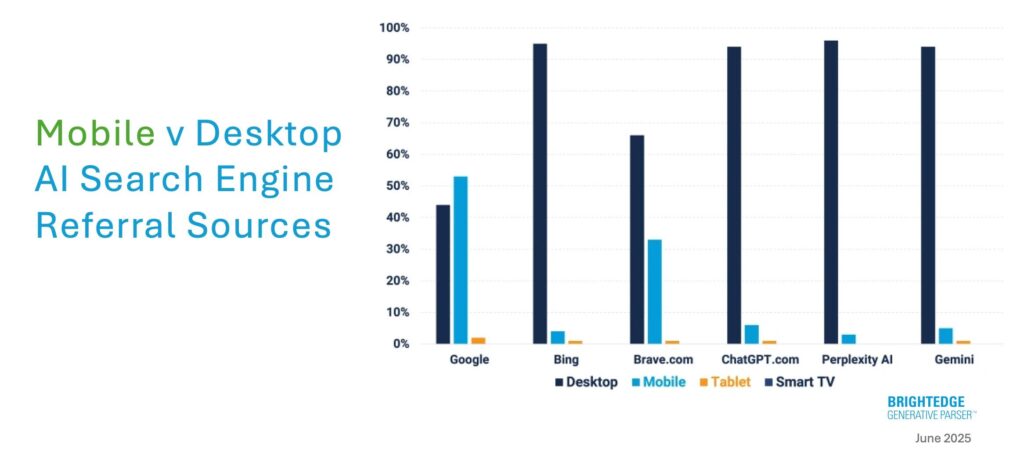The landscape of AI-powered search is evolving, with recent findings revealing that over 90% of AI search traffic originates from desktop devices. While mobile accounts for a significant portion of global web traffic, AI search engines are making their most substantial impact on desktop platforms. This trend presents both challenges and opportunities for marketers, as they must adapt their strategies to this unexpected shift.
A recent analysis by BrightEdge highlights the dominance of desktop traffic across leading AI search platforms in both the United States and Europe. For instance, ChatGPT reports that a staggering 94% of its referral traffic comes from desktop users, with mobile users comprising just 6%. Similarly, Perplexity shows an even greater desktop skew, with 96.5% of referrals coming from desktops and a mere 3.4% from mobile. Even Microsoft Bing follows suit, with 95% of its traffic originating from desktop devices, and Google Gemini reports 91% desktop traffic.
The only exception in this trend is Google Search itself, which maintains a mobile majority, with 53% of its traffic coming from mobile users. This discrepancy can largely be attributed to its status as the default search engine across mobile browsers, particularly on Safari for iPhone users.
Understanding the Disconnect in Mobile AI Search
Despite the apparent popularity of mobile devices, the current landscape suggests that mobile AI search does not translate into significant referral traffic. This issue stems from structural design choices that affect how users interact with AI platforms. Many mobile AI applications, including ChatGPT, often redirect users to in-app previews rather than external websites, complicating the user journey and leading to decreased referral rates.
For instance, while desktop citations typically redirect users immediately to source websites, mobile app interfaces introduce additional steps. Users must click again to access the original content, which diminishes the likelihood of referrals. This design paradigm indicates a fundamental difference in user intent between mobile and desktop searches.
Mobile users are often engaged in quick discovery searches, seeking immediate answers or product comparisons. In contrast, desktop users tend to pursue more comprehensive research and in-depth analysis. This behavioral divide suggests that AI platforms are developing distinct user experiences rather than merely responsive versions of existing products.
Strategic Implications for Marketers
As the AI search landscape continues to evolve, marketers face a crucial need to adapt their strategies for both desktop and mobile platforms. Here are three strategic imperatives to consider:
1. **Develop Device-Specific AI Content Strategies**: Marketers should focus on creating content tailored to the unique behaviors of desktop and mobile users. For desktop, producing in-depth guides and comprehensive resources can leverage the larger screen space and support detailed analysis. Conversely, mobile content should be concise and geared towards immediate discovery, addressing quick queries and local needs.
2. **Prepare for Evolving Mobile AI Search Dynamics**: Current desktop dominance in AI referrals may not last. As mobile AI platforms refine their capabilities and address existing limitations, brands should lay the groundwork for future mobile engagement. Optimizing websites for responsiveness, speed, and accessibility will enhance citation potential as more AI engines begin prioritizing mobile content.
3. **Leverage Current Desktop Opportunities**: While mobile AI search is still maturing, desktop platforms offer immediate opportunities for brands willing to optimize for AI referrals. Creating quotable and authoritative content that AI engines can easily reference is vital. Additionally, integrating rich media formats such as videos and infographics can enhance user engagement and citation potential.
The future of AI search is not merely about choosing between desktop and mobile; it lies in mastering both environments as distinct opportunities to meet varying user needs. As brands prepare for the inevitable growth of mobile AI search, those that recognize and adapt to the current desktop-mobile divide will gain a competitive edge.
Understanding the dynamics between desktop and mobile AI search can prove critical for marketers navigating this rapidly changing landscape. The insights from BrightEdge underscore the importance of strategic planning in optimizing for AI-powered referrals, ensuring that brands remain relevant and competitive as the technology matures.
